The announcement of OFGEM’s new energy price caps due to take effect from 1 October mean that energy customers on standard tariffs will see an increase in their electricity costs from 28p/kWh to 52p/kWh, and from 7p/kWh to 15p/kWh for the cost of gas – check out our full analysis of the changes. Thankfully, there are steps that every small construction business can take to improve energy efficiency and reduce their bills – and the Energy Saving Trust estimates that UK SMEs could save 18-25% on the their energy bills if they are adopted.
Reduce energy consumption from heavy machinery or tools
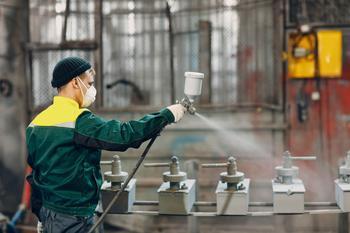
Construction sites are home to a variety of heavy-duty machines and tools that are necessary to getting the job done, but even the most power-hungry can be managed in a way that reduces unnecessary energy consumption.
- Whenever you’re heading off on a break or home at the end of a working day, make sure all motors, fans and conveyors are fully switched off.
- Be sure that all the switches and controls on your machinery are clearly labelled and well understood by all members of staff who will be using them. This will enable them to operate them more efficiently and to deactivate machines more swiftly when appropriate.
- If you manufacture materials, fixtures or fittings for your builds or use any kind of machines that rely on air compressors to function, conducting regular checks on the equipment can help identify air leaks which undermine energy efficiency. Escaping air is often audible at the point of exit, and according to research undertaken by Industrial Plant & Equipment (IP&E) an estimated 30% of electricity used in UK air compressors is wasted in this manner every year. Don’t let your firm lose out due to wasted energy from leaky compressors!
Save electricity by getting your heating under control
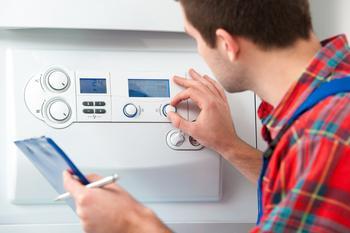
When you’re not on-site, it’s important to keep your heating costs under control for staff in the office. There are several steps you can take to cut down those bills, including:
- Invest in insulation for winter. How much you can save depends on the kind of insulation you use and the nature of the building. The Energy Savings Trust offers a guide to working out how much you could save.
- Insulate the piping or water tanks on your business premises, as well as having heating reflectors installed to prevent heat from escaping a toasty office space.
- Have your heaters and / or boilers serviced regularly to ensure they are functioning efficiently. Implementing smart heating controls could also help ensure you’re only heating the office when you need to.
- Remove obstructions from radiators so that they can operate more effectively.
- Make sure that you’re not wasting energy by running heating devices and air-conditioning simultaneously, or running the heating whilst windows are still open.
- Check your windows - double glazed windows will be more thermally efficient than older single glazed windows. Is it time for an upgrade, or could you add inexpensive secondary glazing like window film during the winter months?
- Assign a designated person to manage the heating controls through the various seasons of the year to reduce waste. You should also ensure the air-conditioning is switched off after staff leave the office to get back on the tools.
- Keep desks away from radiators or air-conditioning outlets.
- Consider investing in a gas boiler to provide heating at a cheaper rate, relative to electricity. Modern gas boilers tend to be more efficient, according to EDF Energy, and can be controlled easily using smart thermostats. What’s more, new regulations expected under the 2025 Future Homes Standard should not affect replacement boilers in existing buildings. Check out our Home Picks selection of great deals on boilers to get an idea of what’s available.
Pro tip: Cranking your thermostat up to the maximum setting will not warm up your office any more quickly than setting it to an appropriate temperature, so it’s not worth the additional expense.
Bright ideas for saving electricity on lighting

Keeping a close eye on your use of lighting can help to brighten your energy bill prospects – here a few things to look out for:
- Turn off lights when they are not in use – this will reduce your energy costs and contrary to popular belief the process of switching them on or off does not consume more energy than simply leaving them on for extended periods.
- Use motion sensor lights in areas of your warehouse or working spaces that are not occupied for long periods of the working day,
- Replace your older bulbs with LED lighting: According to the Renewable Energy Hub, LED lighting can save you up to 90% on your energy relative to using traditional incandescent bulbs. LED lighting is also significantly longer lasting, more eco-friendly and produce maximum illumination as soon as they are switched on, rather than taking time to “warm up” like compact fluorescent lamps (CFLs).
- Save energy by repositioning shelves, storage crates or large pieces of machinery / tools to unblock windows and allow more natural light into your office or warehouse spaces.
Tips for saving energy through energy efficient appliances
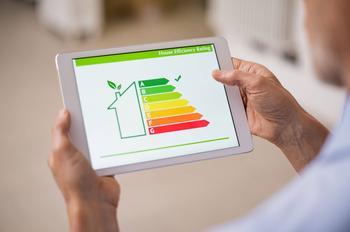
There are a lot of things we tend to take for granted when it comes to getting the most efficient use of our appliances. Keep a keen eye out for easy wins like the following to improve your business’s energy efficiency:
- Switch off any laptops or PCs that are not in current use, rather than simply leaving them on standby. A good way to ensure this is happening is to encourage your team to switch devices off at the plug when they finish using them, and to check the switches yourself at the end of the working day. Most modern devices also feature a power-saving setting, which can be used to reduce energy consumption even when you’re still making use of it.
- According to Harvard University, reducing the brightness of computer monitor screens from 100% to 70% can cut their energy consumption by 20%. If you use computer aided design (CAD) software to demonstrate projects to clients or have an office team to look after admin duties this could be a quick, easy win.
- Regular tea brews are an essential part of the working day for many a busy building team - but switching off / unplugging the kettle when it’s not being used can help you make regular cuts to your energy consumption. You could also consider upgrading your old kettle to a newer, more energy efficient model and avoid overfilling it when you’re just making a cuppa for yourself.
- If you have appliances like fridges / freezers that need replacing soon, invest in ones with a good energy rating; ideally A-rated or for older appliances, A+++. The Energy Saving Trust offers useful advice for helping you find appliances that will help keep your energy consumption under control.
- If your office space is equipped with a dishwasher, then waiting until it is fully loaded before running it is a good way to cut down on energy expenditure, rather than just washing utensils as soon as they are finished with by staff.
Conduct regular energy efficiency audits for your business
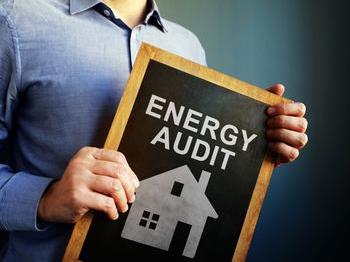
Setting aside time to regularly evaluate which aspects of your business are consuming the most energy is a good way to keep tabs on whether you’re becoming more, or less energy efficient.
You may notice that at certain times of the day more power is being used by staff as they come into the office to check emails, charge tools or grab that morning coffee. Alternatively, some of your builds may require you to bring aspects of the projects in-house to work on fixtures, fittings or furniture in your workshop or warehouse – and these are the times when having a keen eye for energy efficiency can save you the most money.
The Energy Saving Trust have helpfully provided a free template walkaround checklist you can take with you as you investigate which aspects of your business might require some fine tuning to reduce energy waste.
Keep an eye on your bills and take note of any increases
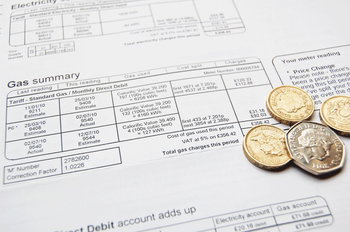
Keeping a close eye on your energy bills and meter readings can help you spot increasing expenditures early, which could alert you to an efficiency or fault that needs to be addressed to keep bills down.
If your energy supplier is consistently hiking up prices, it could be time to seek out more competitive quotes from alternative providers before your current billing period ends. When the time comes, it could be worth contacting your energy supplier to discuss better rates or potential payment plans, either of which could save you the hassle of switching.
Educate the rest of your business about how to save energy
All the tips outlined in this article work best when everyone on your staff is up to speed on what needs to be done. Energy efficiency is crucial for businesses grappling with today’s high energy and material prices, so it’s important you let them know that they have .
You might choose to have a staff meeting to discuss key steps everyone can take to reduce energy waste or circulate an email to everybody who uses your office equipment or construction machinery. Alternatively, delegating this task to your site managers can help to get the message across more quickly without needing to gather everybody in one place, and encourage greater ownership within your teams of their energy management procedures.
Sharing your successes and challenges with regards to saving energy can help everybody understand how well they are doing, and to realise they all have a role to play.
Take advantage of tax relief available to UK businesses
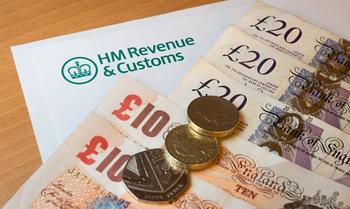
Under UK law businesses pay environmental taxes are paid by businesses on electricity, gas and solid fuels such as coal. If your business satisfies certain conditions - such as being a small business that does not require large amounts of energy – you may be eligible for tax relief. In some instances, the purchasing of energy-efficient technology as part of a broader approach to reduce carbon emissions can also qualify you for tax relief under regulations pertaining to the Climate Change Levy.
Check out the UK government’s guidance on which businesses are eligible for tax relief, and how to apply for it. It may be worth consulting with an accountant to better understand the process.






